- Introduction
- Key Features to Look For in Manufacturing Production Software
- The 9 Best Manufacturing Production Software
- 2. JobBOSS²
- 3. Fishbowl Manufacturing
- 4. Prodsmart by Autodesk (Fusion Operations)
- 5. MRPeasy
- 6. Oracle NetSuite Manufacturing Edition
- 7. Plex Smart Manufacturing Platform
- 8. Statii
- 9. Epicor Kinetic
- Final Thoughts on Choosing the Best Manufacturing Production Software
- Frequently Asked Questions
Table of Contents
9 Best Manufacturing Production Software
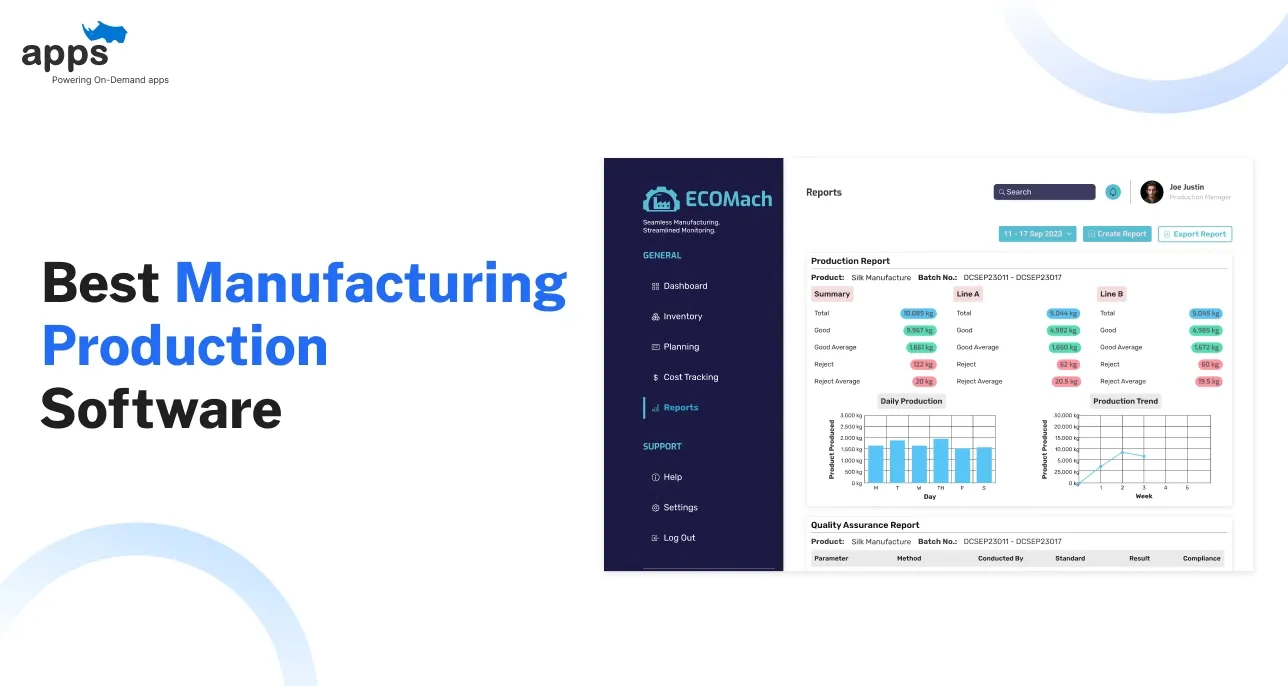
Introduction
Manufacturing production software refers to digital systems used by factories to manage and optimize production processes.
These tools range from factory automation software and MES (Manufacturing Execution Systems) to manufacturing ERP and inventory management solutions.
They matter because production managers and manufacturers need real-time data and visibility across the shop floor. Proper software helps streamline planning and scheduling, cut costs, and speed decision-making.
Typical benefits include increased equipment uptime, higher product quality, and more agile production responses.
Features like production planning tools that forecast demand, scheduling modules that optimize workflows, and analytics dashboards that give complete oversight are standard.
Below, we introduce the key advantages of these systems and review the 9 top manufacturing production software tools for 2025.
Suggested Reading:
What is Manufacturing Process Management?
Key Features to Look For in Manufacturing Production Software
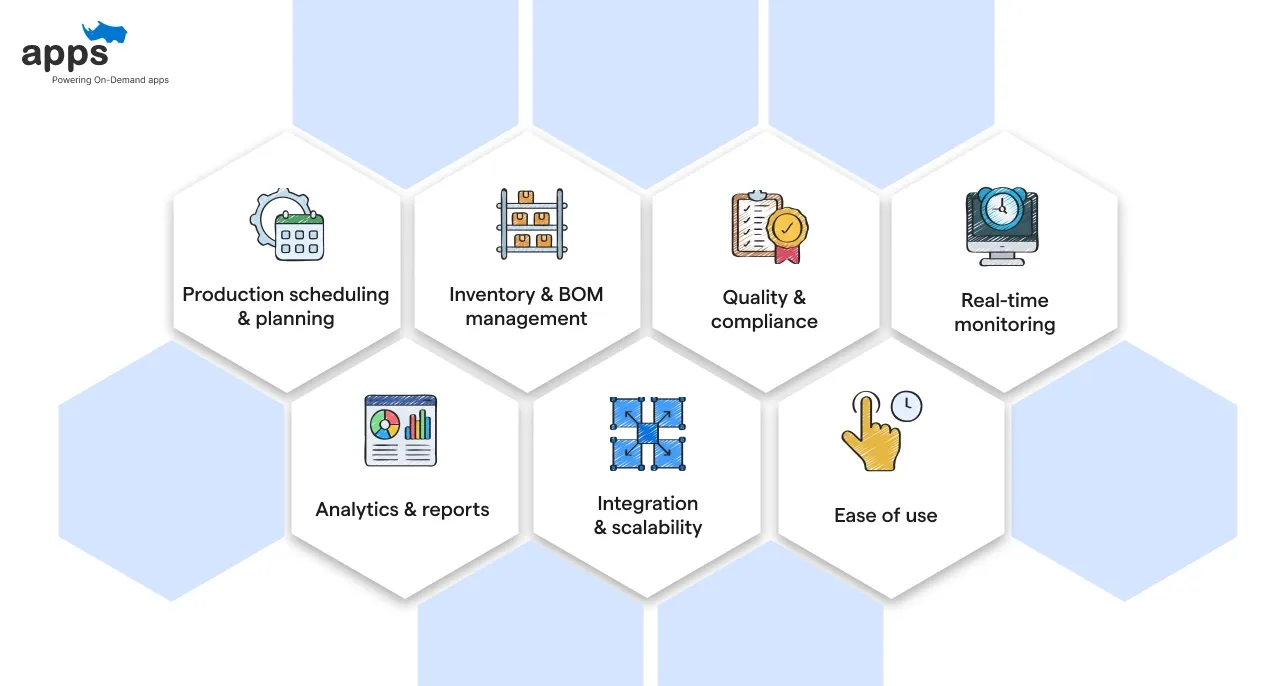
The best manufacturing production software delivers core functionalities for modern factories. Look for real-time tracking and reporting of production metrics, robust scheduling (drag-and-drop, Gantt charts), and advanced inventory management.
Integration is critical – systems should connect with accounting, eCommerce, and shop-floor machines. Many platforms now “connect, automate, track, and analyze” operations from the plant floor to the top floor.
Mobile access and user-friendly dashboards are also valuable for managers on the move.
- Production scheduling & planning: Supports drag-and-drop scheduling, finite-capacity Gantt charts, and predictive material requirements planning.
- Inventory & BOM management: Tracks raw materials, WIP, and finished goods with multi-level BOMs, lot/serial control, and automated reordering alerts.
- Quality & compliance: Manages quality checks, traceability logs, and regulatory audits to ensure product quality.
- Real-time monitoring: Captures shop-floor data (OEE, downtime, production counts) with terminals or IoT, giving instant visibility into status and bottlenecks.
- Analytics & reports: Built-in KPIs and dashboards (cycle time, utilization, throughput) support data-driven decisions.
- Integration & scalability: Works with ERP/accounting (QuickBooks, NetSuite) and factory systems (SCADA, PLCs) for end-to-end connectivity.
- Ease of use: Intuitive UI, easy implementation, and strong vendor support to ensure quick adoption.
The 9 Best Manufacturing Production Software
Here’s a quick comparison table summarizing the 9 Best Manufacturing Production Software tools, followed by two intro lines to contextualize it.
Quick Summary Table: Top Manufacturing Production Software Tools
Modern manufacturing production software empowers factories with real-time data, automation, and streamlined workflows. Here’s a quick overview of the top 9 tools in 2025 to help you choose faster.
Software | Best For | Key Strengths | Limitations | Pricing (Starts At) |
| Katana | SMB manufacturers (DTC, food, light assembly) | Visual dashboard, real-time inventory | Limited customization, pricey upgrades | $179/user/month (free trial) |
| JobBOSS² | Custom job shops, CNC, fabrication | Detailed job costing, real-time tracking | Dated UI, complex setup | $2,700 one-time/license |
| Fishbowl Manufacturing | Inventory-heavy small to mid-sized firms | QuickBooks integration, barcode tracking | Clunky UI, no free trial | Custom quote (no trial) |
| Prodsmart (Autodesk) | Multi-site or mobile MES users | Real-time shop data, tablet-friendly UI | Learning curve, limited finite scheduling | ~$2,000/year/user (14-day trial) |
| MRPeasy | Micro to small manufacturers | Affordable, all-in-one cloud MRP | Basic reports, limited deep features | $49/user/month (30-day trial) |
| NetSuite Manufacturing | Midsize to large manufacturers | Full ERP + MRP suite, scalable cloud | High TCO, complex implementation | Custom pricing (no trial) |
| Plex Smart Manufacturing | Automotive, aerospace, food/bev sectors | IIoT, MES, QMS, advanced analytics | Pricey, long onboarding | ~$3,000/month (no trial) |
| Statii | Small make-to-order firms (UK & beyond) | Easy setup, strong support | Missing advanced features | £130/month (trial on request) |
| Epicor Kinetic | Discrete, make-to-stock, ETO manufacturers | Deep production + planning tools | Steep learning, upgrade-heavy | ~$2,100/month (no trial) |
1. Katana
Katana is a cloud-based manufacturing production software (ERP/MRP) built for small and mid-sized producers. It centralizes sales orders, raw material inventories, and production plans in one system.
Key features include real-time inventory management (batch, serial, and expiry tracking), demand forecasting, production scheduling (drag-and-drop), and built-in dashboards.
Katana offers integrations with ecommerce, accounting, and shipping platforms to automate workflows. It even lets users issue purchase orders automatically when stock runs low.
For example, its visual Kanban boards and inventory alerts highlight bottlenecks at a glance. Katana provides end-to-end traceability from procurement to shipment.
- Pros: Users praise Katana’s intuitive dashboards and seamless order/inventory tracking. Its real-time visibility and integrations (e.g., with Shopify, QuickBooks) reduce manual work and errors.
- Cons: Some find the interface basic and wish for deeper customization. The Advanced pricing can be high for startups, and setting up manufacturing recipes requires initial effort.
- Pricing/Trial: Starts at $179 per user per month (Starter plan) with a free trial available. (Higher plans cover more inventory locations.)
- Ideal for: Small to midsize manufacturers (e.g., electronics assemblers, craft food/beverage, light manufacturing) that want cloud inventory control and production planning in one package. Katana’s visual tools are popular in industries needing tight batch tracking.
2. JobBOSS²
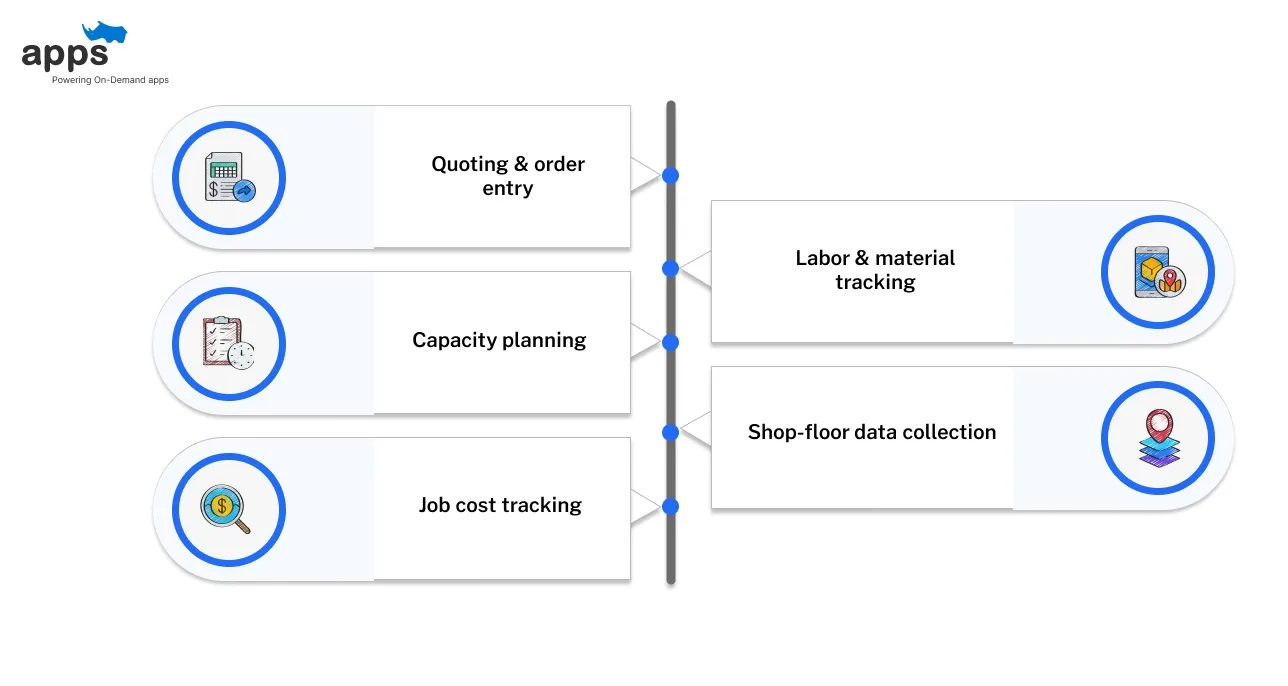
JobBOSS² is a manufacturing production software solution built for custom and discrete manufacturers. It gives shop managers real-time control over quotes, orders, and production schedules.
Core features include quoting, order entry, capacity planning, job cost tracking, labor and material tracking, and shop-floor data collection.
The system provides instant visibility into job progress, labor efficiency, and deadlines, improving on-time delivery and profitability.
JobBOSS² also includes a basic CRM and integrates with accounting and CAD/CAM tools for seamless quoting and order processing.
- Pros: Highly customizable dashboards and workflows help manage complex jobs. Users praise JobBOSS²’s detailed job costing and inventory tracking. It excels at handling repeat orders, splitting jobs, and capturing data.
- Cons: Some features (like bin location tracking) are limited without add-ons. The interface can feel dated, and the setup is complex. Smaller shops may face a steep learning curve and more extended deployment.
- Pricing/Trial: Starts at a one-time fee (around $2,700 per license) with optional cloud hosting. No free trial is offered.
- Idamachine: Machine shops and custom manufacturers (metal fabrication, CNC, etc.) need robust production planning and costing tools. JobBOSS² scales from small shops to larger plants with multiple work centers.
3. Fishbowl Manufacturing
Fishbowl Manufacturing is a manufacturing production software system designed for small to mid-sized manufacturers. It provides real-time visibility of stock across warehouses and production.
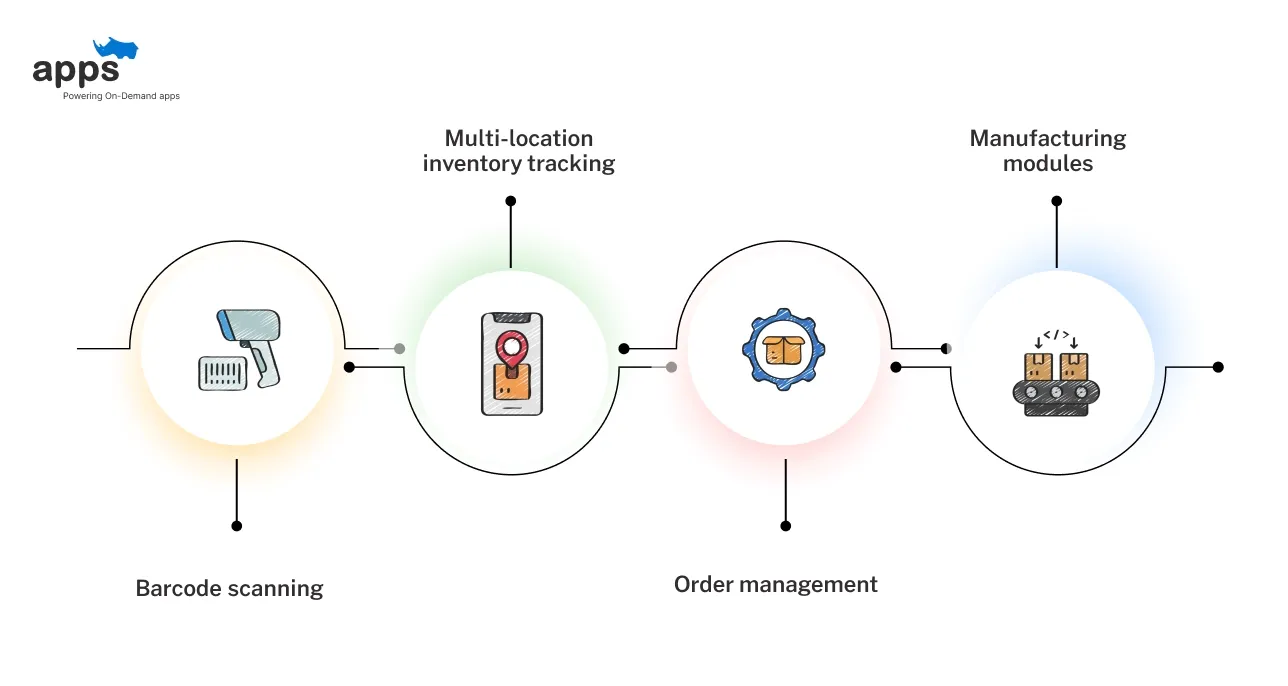
Key features include barcode scanning, multi-location inventory tracking, order management, manufacturing modules like kitting, work orders, and labor cost tracking.
Fishbowl integrates tightly with accounting systems (QuickBooks, Xero) and ecommerce platforms to automate purchasing and financial processes.
It is especially popular with QuickBooks users, providing a real-time connection between warehouse operations and accounting.
- Pros: Users praise Fishbowl’s accurate inventory tracking and powerful integrations. It helps streamline operations and improve accuracy, serving as a bridge between the shop floor and finance.
- Cons: Some users find Fishbowl’s interface cluttered and its initial setup challenging. Support quality can be mixed, and deeper manufacturing features require customization or professional services.
- Pricing/Trial: Pricing is custom-based on modules and users; Fishbowl has no free trial or plan. (Typically sold via authorized resellers.)
- Ideal for: Manufacturers and distributors needing substantial inventory and order control, especially those already using QuickBooks. Fishbowl is well-suited for businesses with extensive warehousing or requiring lot/serial tracking across multiple sites.
4. Prodsmart by Autodesk (Fusion Operations)
Prodsmart (now Autodesk Fusion Operations) is a manufacturing production software (MES) for manufacturers needing real-time production tracking. It is cloud- and mobile-based, letting operators record work orders, scrap, and quality checks via tablet or smartphone.
Key features include production scheduling, work center dashboards, OEE and downtime monitoring, barcode scanning, and quality traceability.
It empowers teams to “digitize scheduling, workflows, and resource management” with real-time visibility.
Additionally, the platform can connect to shop-floor machines and sensors (IIoT) for automated data collection, enabling paperless production and analytics.
- Pros: Users highlight its ability to automate shop-floor tasks and integrate multi-site orders. One review noted it made “getting orders from multiple sites easy” and eliminated manual entry.
- Cons: The interface can be complex; one user said the “front end of the software can be a little overwhelming” initially. Implementation and change management may require support from consultants.
- Pricing/Trial: Fusion Operations starts around $2,000 per user per year, with a free 14-day trial available. (Pricing is tiered and billed annually.)
- Ideal for: Small and mid-sized manufacturers (e.g., discrete fabricators, electronics, metal shops) who want a tablet-based MES to connect production, quality, and maintenance data in real time. Its mobile-first design fits teams with remote or paperless shop floors.
5. MRPeasy
MRPeasy is a cloud-based manufacturing production software (MRP/ERP) for small manufacturers (10-200 users). It provides a comprehensive suite that includes inventory control, purchasing, production scheduling, sales order management, and basic accounting.
Key features include multi-level bill-of-materials (BOM) management, manufacturing routing, work order management, shop-floor data collection, and quality control.
MRPeasy enables one-click costing and lead-time quoting, helping firms optimize capacity and prevent stockouts.
It offers integrations with payment gateways and popular accounting packages.
- Pros: Users note MRPeasy’s simplicity and value: it is affordable and easy to learn. It covers many functions out-of-the-box (inventory, purchasing, production, sales, BOMs) and offers good support.
- Cons: Some limitations include basic invoicing (often handled via Xero integration) and limited advanced reporting/customization. Workarounds are needed for complex multi-stage production, and the user interface can feel outdated in places.
- Pricing/Trial: Plans start at ~$49 per monthly user. MRPeasy offers a free 30-day trial and pay-as-you-go subscriptions, making it low-risk to try.
- Ideal for: Very small to mid-size manufacturers (e.g., startups, custom parts, electronics) who need an affordable all-in-one production planning tool. Micro-manufacturers and growing shops with outgrown spreadsheets often use it, but aren’t ready for heavy ERP.
6. Oracle NetSuite Manufacturing Edition
Oracle NetSuite Manufacturing Edition is a cloud-based manufacturing production software (ERP) suite with built-in manufacturing modules. It caters to businesses ranging from simple assembly operations to complex discrete and process manufacturing.
The system integrates work order management, WIP/routing, and advanced features like finite capacity scheduling and MES-quality tracking with comprehensive inventory, CRM, and financials.
NetSuite offers end-to-end functionality: multi-site inventory tracking, demand planning (MRP), shop-floor scheduling, and quality management across production lines.
It also provides embedded analytics (SuiteAnalytics) and configurable roles to streamline management tasks.
- Pros: NetSuite provides strong scalability and multi-module integration as a fully cloud-based ERP. It includes CRM, eCommerce, and HR tools, making it a complete suite. The platform is highly configurable, and regular updates add new capabilities.
- Cons: The platform can be expensive and complex to implement. Some users note limited customization flexibility and high total cost of ownership. Deployments often require experienced consultants.
- Pricing/Trial: Pricing is not listed publicly and typically requires a custom quote from Oracle. There is no free trial for this enterprise solution. (Deployment often involves a minimum annual spend.)
- Ideal for: Mid-size to large manufacturers that need a unified ERP and production system. It fits companies that require strong financials, global supply chain integration, and production control (e.g., multi-plant manufacturers, multinational operations).
7. Plex Smart Manufacturing Platform

Plex Smart Manufacturing Platform by Rockwell Automation is a cloud-based manufacturing production software (ERP/MES) that connects, automates, tracks, and analyzes shop-floor and enterprise operations.
It provides modules for shop-floor execution, quality management, supply chain planning, IIoT device integration, and analytics.
Key features include real-time production monitoring, automated data capture (via IoT), quality control (QMS), supply-chain optimization, and comprehensive asset performance management.
For example, its MES provides detailed OEE analytics and an asset management suite to monitor equipment uptime.
- Pros: Users find Plex very comprehensive. Its cloud architecture means access from anywhere and includes specialized features (advanced quality, maintenance, compliance) not found in many standard ERP systems.
- Cons: Some implementations have been problematic; reviewers mention technical issues (e.g., mislabeling, bugs) and a steep learning curve. Because Plex is feature-rich, it often requires dedicated IT support and thorough user training.
- Pricing/Trial: Plex starts around $3,000 monthly for a basic plan, with higher tiers for add-on modules. There is no free trial, but demos can be arranged.
- Ideal for: Medium to large manufacturers (automotive, food/bev, life sciences, industrial equipment) requiring a fully integrated, innovative manufacturing system. It is best for companies needing deep MES/QMS/IIoT capabilities alongside ERP.
8. Statii
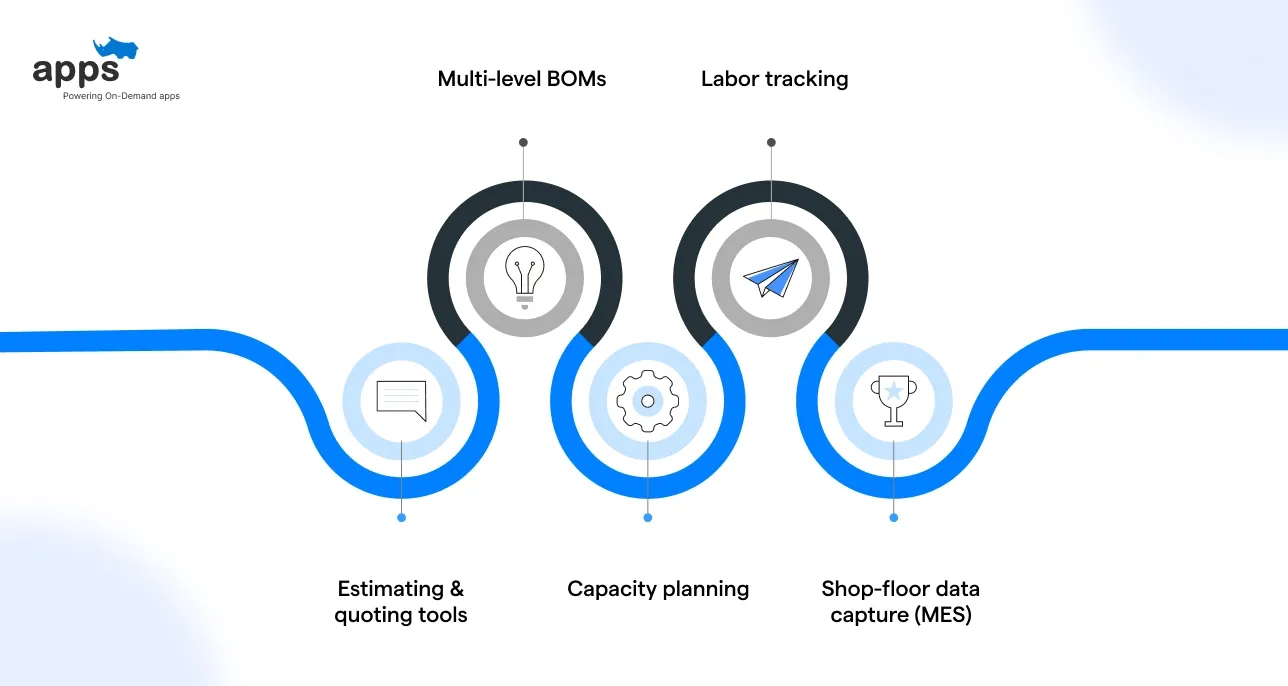
Statii is a UK-based manufacturing production software (cloud MRP) for small to medium make-to-order manufacturers. It combines quoting, order management, inventory, and production scheduling in one platform.
Key features include estimating and quoting tools, multi-level bills of materials (BOMs), capacity planning, labor tracking, and shop-floor data capture (MES).
The platform emphasizes quick setup: it comes with unlimited phone support and a straightforward interface for faster adoption.
Statii also automates routine tasks (like issuing purchase orders and generating invoices) to minimize errors.
- Pros: Statii is praised for its simplicity and customer service. Users report it was a “perfect product” for their needs, with excellent support across time zones. Features like cost tracking and quoting work well out of the box.
- Cons: Some users find the interface unintuitive, noting difficulty correcting mistakes or finding certain features. A few basic features (like advanced reporting) are missing, and the help documentation can be hard to navigate.
- Pricing/Trial: Plans start at £130 per month, with no long-term commitment (30-day rolling contract). A free trial/demo is available upon request.
- Ideal for: Small bespoke manufacturers (e.g., metal fabrication, custom signage, small electronics) who want an easy-to-use, all-in-one MRP and shop-floor system with firm support. It fits shops that need simple quoting-to-production without overkill.
9. Epicor Kinetic
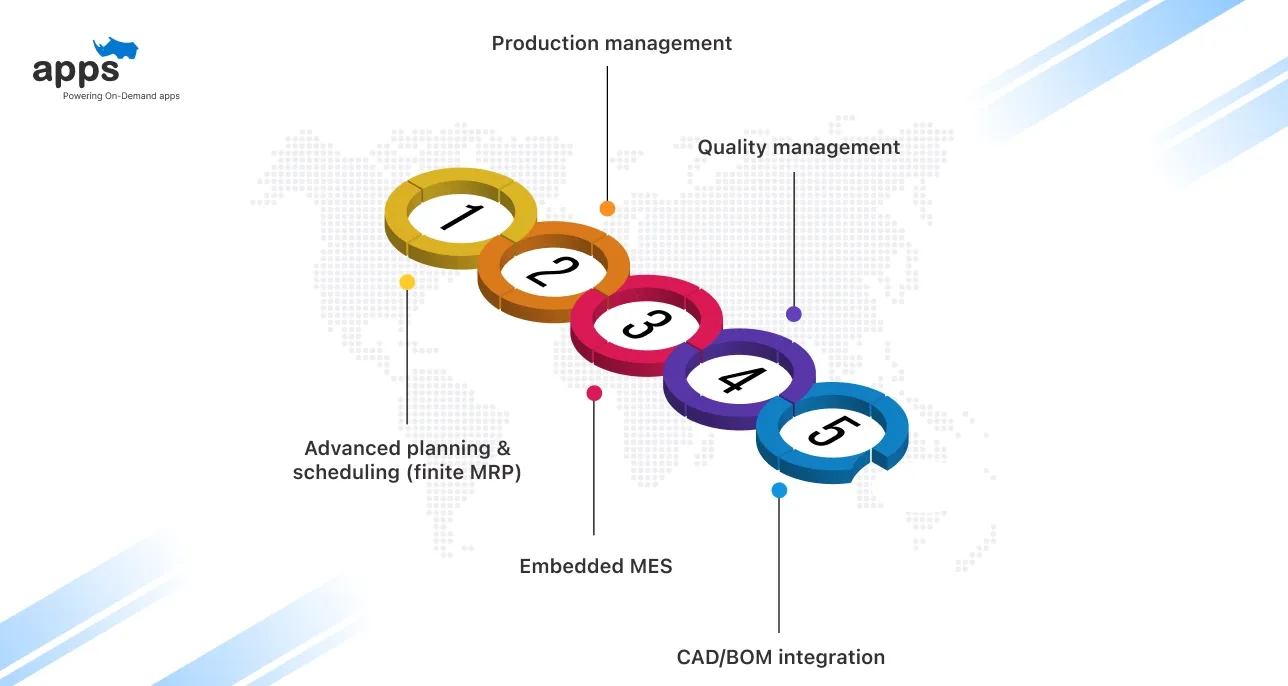
Epicor Kinetic is a manufacturing production software (cloud ERP) built specifically for manufacturers. It offers end-to-end functionality covering finance, supply chain, project management, and factory operations.
Key features include advanced planning and scheduling (finite MRP), production management, embedded MES shop-floor data capture, quality management, and CAD/BOM integration.
The system supports product configuration and has built-in analytics and BI.
Kinetic is tailored for discrete and make-to-order environments and offers high configurability (built-in workflow tools and dashboards).
- Pros: Epicor Kinetic’s strength is its manufacturing focus. It provides real-time shop-floor data collection and powerful reporting. It integrates well with other Epicor modules and external tools (e.g., Excel).
- Cons: Implementation can be lengthy and costly. Users cite a steep learning curve and a complex interface. The product may be heavy for tiny shops and less suited to huge global enterprises.
- Pricing/Trial: Pricing starts around $2,100 per month (for a small team of users), varying by modules. Epicor typically requires an enterprise contract; no free trial is generally offered.
- Ideal for: Mid-market manufacturers (roughly 10–1000+ users) in discrete industries (automotive, industrial equipment, electronics) who need a robust integrated ERP/MES solution. Its strengths are in complex job shop, ETO, or make-to-stock operations with detailed engineering.
Final Thoughts on Choosing the Best Manufacturing Production Software
Manufacturing production software is a critical investment for any production manager or SME aiming to boost efficiency and adapt to Industry 4.0.
Each of the nine solutions above excels in different areas, so weigh your priorities (shop-floor tracking, integration, or budget) when choosing. Most vendors offer demos or free trials – taking advantage of these can reveal the best fit for your workflows.
Be sure to involve key users early (e.g., shop foremen, planners) and plan for training. Remember that the feature list is as important as implementation support and user adoption.
If your requirements are unique, consider custom solutions: AppsRhino specializes in building and integrating tailor-made manufacturing apps. You can adopt the right production software to streamline your operations and stay competitive in 2025 and beyond by leveraging expert guidance and trial periods.
Frequently Asked Questions
What is manufacturing production software?
Manufacturing production software helps manage production planning, scheduling, inventory, and quality control. It improves efficiency, reduces manual errors, and gives real-time visibility across operations.
Who should use manufacturing production software?
It’s ideal for small factories, mid-sized manufacturers, and large enterprises needing better control, automation, and real-time tracking across production and inventory workflows.
How does manufacturing production software reduce costs?
It automates repetitive tasks, reduces inventory waste, optimizes labor, and prevents production delays, leading to fewer errors and greater operational efficiency.
Is cloud-based manufacturing production software better?
Yes. Cloud-based tools offer faster setup, lower upfront costs, automatic updates, and anytime-anywhere access for managers and teams across different locations.
Can small manufacturers afford production software?
Absolutely. Tools like MRPeasy and Katana offer affordable plans starting at $49/month, designed for small manufacturers looking to upgrade from spreadsheets.
Table of Contents
- Introduction
- Key Features to Look For in Manufacturing Production Software
- The 9 Best Manufacturing Production Software
- 2. JobBOSS²
- 3. Fishbowl Manufacturing
- 4. Prodsmart by Autodesk (Fusion Operations)
- 5. MRPeasy
- 6. Oracle NetSuite Manufacturing Edition
- 7. Plex Smart Manufacturing Platform
- 8. Statii
- 9. Epicor Kinetic
- Final Thoughts on Choosing the Best Manufacturing Production Software
- Frequently Asked Questions


